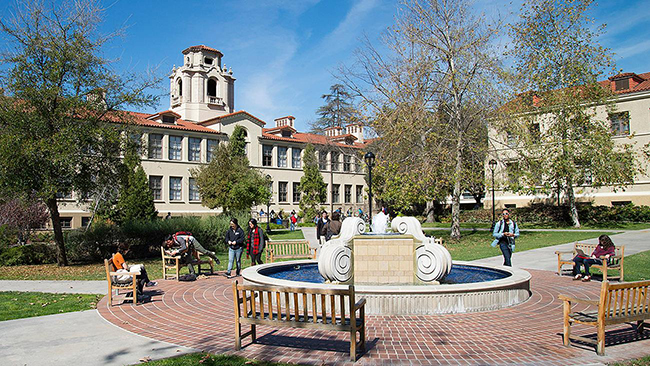Judge sides with Golden State Water in final decision
Superior Court Judge Richard Fruin ruled against Claremont’s effort to take over the water system in his final decision released last week.
The final decision was handed down December 9, with Judge Fruin siding with Golden State Water Company’s assertion that Claremonters won’t be better off with their water under municipal control. The ruling is a devastating step back in the city’s ongoing effort to lay claim to a system that has belonged to GSW since 1929.
The ruling is largely unchanged from the judge’s tentative decision issued in November, save for extra passages regarding the admission of an “administrative record” from the city and potential use if the city were to take over the system.
In response to the tentative decision, city attorneys argued that the court refused to accept an administrative record containing support for the Resolutions of Necessity, the backbone of the city’s case. In doing this, the city alleged, the court erred in judgement, dismissing a key piece of evidence in the right-to-take trial.
But the court refuted this notion, stating that an administrative record is not required in a trial proceeding. Further, Judge Fruin admonished the city for not following administrative record procedure when the city’s attorneys gave the court a CD containing as many as 13,000 documents. Judge Fruin said the documents should have been filed with the court in paper form, with a proper index.
“The court—after a trial during which both parties had the opportunity to present documentary evidence—is not required to review a CD displaying more than 13,000 pages to look for reasons that could support the resolutions of necessity adopted by the city council,” the ruling stated.
The court also challenged the city’s plans for the system once it took control. Throughout the trial, GSW’s attorneys argued that the city planned to take over the system and run it “as is,” without any significant improvements. City attorneys attempted to introduce a more complete outline during the trial, but those plans were not initially presented in pre-trial documents. The court sided with GSW in its decision.
The city rebutted that claim in its objection, stating its improvement plans were merely a way to rebut GSW’s claims that the system was well-run. In his final decision, Judge Fruin said the city essentially admitted that it wasn’t serious about making improvements to the system after all.
Because of this, the court said, “the evidence that additional investment would improve the operation of the Claremont water system is irrelevant to the issue of whether condemnation is ‘required’ for ‘the public interest and necessity’ and is ‘a more necessary public use.’”
In addition, the court claimed that deficiencies in the system were only discovered by the city’s attorneys during the discovery process, and therefore not included within the resolutions of necessity.
“For this additional reason, the evidence offered at trial by the city of the need for further infrastructure investment in the Claremont water system is irrelevant,” the court wrote. “The presumptions established by the city council’s adoption of the amended resolutions of necessity in June 2015 did not presuppose the need for any changes in the Claremont water system.”
The court noted that the city had asked for a further hearing to settle the final decision but that request was denied.
Mayor Sam Pedroza responded to the decision in a 16-page letter. The letter, dated December 13, outlines the history of the eminent domain claim and nearly everything before, during and after the trial.
Mr. Pedroza tackled deficiencies in the infrastructure of the water system, noting that a fire in the Claraboya area could have been prevented if there was sufficient well water in the area. Mr. Pedroza also said that GSW’s own witnesses “acknowledged at trial that the Claremont water system is sub-optimal, suffering from operational inefficiencies, a high number of main breaks, and poorly aligned pressure zones that need to be consolidated and/or re-aligned.
“Counsel for Golden State even called the system ‘quirky.’ This is the condition of the Claremont water system after more than 80 years of Golden State’s stewardship,” he added.
Mr. Pedroza also said the city was “surprised” by the ruling, noting that throughout the trial, Judge Fruin made statements in support of the takeover.
“Specifically, the court concluded on the record that the city’s acquisition of the Claremont water system is in the city’s best interest, stating, ‘I think the adoption of the resolutions of necessity, which adoption I understand was unanimous, is sufficient to establish the city’s decision that the condemnation is in its best interests,’” Mr. Pedroza said.
The mayor talked at length about the city’s deal with La Verne, which would allow Claremont’s westerly neighbor to oversee operations. Throughout the trial, La Verne’s track record was blasted by GSW’s attorneys, who accused La Verne of failing lead and E. coli contamination tests and fudging consumer reports.
Mr. Pedroza noted that La Verne was only cited once in 2012 in its more than 100-year history as an operator, and that the citation was for lead contamination of plumbing at a private residence.
Mr. Pedroza accused GSW of having water deficiencies of its own, pointing to an issue of black water coming out of taps in Gardena in 2015.
“The court, however, refused to hear this evidence at trial,” Mr. Pedroza said.
In a statement provided to the COURIER on Wednesday, GSW praised the judge’s decision.
“Golden State Water Company is proud of its record of service in Claremont and is pleased that the Hon. Richard L. Fruin Jr.’s (Judge, Los Angeles Superior Court) Final Decision recognizes our commitment to the community and rejects the city of Claremont’s attempt to take over the water system,” GSW said. “The ruling notes that evidence was clear, convincing and indisputable that the city’s eminent domain lawsuit was without merit.”
GSW also noted the trial had polarized the community, and pledged to gain the trust of Claremont customers.
“Our focus has always been on delivering quality water and great customer service, and we look forward to continuing to serve Claremont,” the statement noted. “We recognize the trial has been divisive, but we will work diligently to rebuild trust and strengthen relationships with customers and community leaders. We value the opportunity to serve Claremont and are proud to provide safe, reliable drinking water to current and future generations.”
The ruling is a devastating setback for the city, which has looked into the idea of taking over the water system for decades.
The effort kicked into high gear in 2010 when residents saw sharp spikes in their water bills and Golden State repeatedly approached the California Public Utlities Commission for more rate increases. Finally, in 2014, Claremont residents overwhelmingly approved Measure W by nearly 72 percent, giving the city the green light to pursue the system, resulting in a 21-day trial that ended on August 10.
During Tuesday’s city council meeting, a number of residents came forward during public comment to respond to the final decision. Resident Arin Allen called on the city to appeal the ruling and called the judge’s decision to dismiss a process spearheaded by voters “undemocratic.”
But there were critics as well. Resident Ludd Trozpek lambasted Mr. Pedroza’s report, calling it “cherry-picked” and full of misrepresentations.
“Mr. Pedroza’s report is not worth the paper it’s written on,” he said.
The councilmembers hinted at a possible appeal during the meeting. The city has 60 days to issue an appeal on the ruling.
Mayor Pro Tem Larry Schroeder noted that the ruling is but an additional step in a larger process.
“This is a process, eminent domain is a process,” he said. “And we’ve taken the first step here, and now we will consider the next steps. So to say it’s time to take our marbles and go home—it may not be. Council will consider other actions. This is definitely the first step.”
—Matthew Bramlett
news@claremont-courier.com
[Editor’s note: this post has been updated to include a statement from Golden State Water Company.]










0 Comments